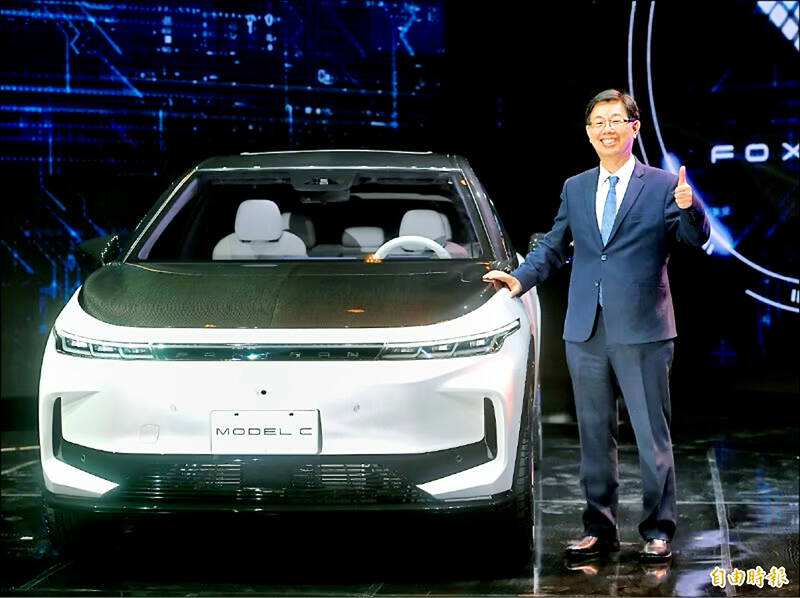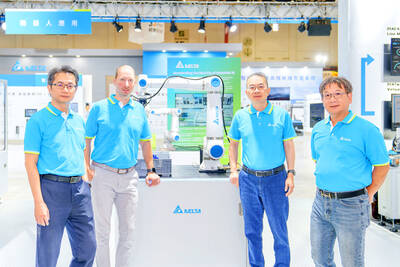Ohio-based Youngstown State University (YSU) and Hon Hai Precision Industry Co (鴻海精密), also known as Foxconn Technology Group (富士康科技集團), yesterday announced intentions to establish a partnership to launch an electric vehicle (EV) workforce training and innovation center.
The center would focus on helping the nascent EV industry build and grow a sustainable workforce specializing in advanced manufacturing, energy storage and other integrated technology solutions, such as artificial intelligence, 5G and cybersecurity, Foxconn said in a statement.
YSU and Foxconn would develop short and long-term strategies, including the establishment of a training and innovation facility in Lordstown, Ohio, where Foxconn owns a factory for EV manufacturing, Foxconn said.

Photo: Fang Pin-chao, Taipei Times
“Leveraging our manufacturing strengths, we will redefine contract design and manufacturing services within the automotive sector,” Foxconn chief product officer Jerry Hsiao (蕭才祐) said, adding that “Foxconn is proud to have the opportunity to work with YSU to meet the demand for a highly skilled workforce of the future.”
The US Department of Energy earlier this year commissioned YSU to conduct a national and regional labor market assessment of the energy storage industry for EVs.
YSU and Foxconn hope the center will have a nationwide reach in the US and can have a strong economic impact on the region and beyond, YSU president Jim Tressel said.
“Now is the time to break down geographic and institutional silos to provide workforce solutions that accelerate the ability for industry, academia, government and workforce organizations to come together and more quickly deploy resources and strategies to address industry workforce needs,” Tressel said.
Jennifer Oddo, the executive director of workforce education and innovation at YSU, said that there is a need for a national talent pool to accelerate the adoption of programs, such as registered apprenticeships, stackable industry credentials and new applied learning models that address ever-changing industry needs.
“A national hub will help break down barriers and access to educational programming, create greater awareness of opportunities and leverage standardized best practices that can be deployed across any geographic footprint,” she said.

SETBACK: Apple’s India iPhone push has been disrupted after Foxconn recalled hundreds of Chinese engineers, amid Beijing’s attempts to curb tech transfers Apple Inc assembly partner Hon Hai Precision Industry Co (鴻海精密), also known internationally as Foxconn Technology Group (富士康科技集團), has recalled about 300 Chinese engineers from a factory in India, the latest setback for the iPhone maker’s push to rapidly expand in the country. The extraction of Chinese workers from the factory of Yuzhan Technology (India) Private Ltd, a Hon Hai component unit, in southern Tamil Nadu state, is the second such move in a few months. The company has started flying in Taiwanese engineers to replace staff leaving, people familiar with the matter said, asking not to be named, as the

The prices of gasoline and diesel at domestic fuel stations are to rise NT$0.1 and NT$0.4 per liter this week respectively, after international crude oil prices rose last week, CPC Corp, Taiwan (台灣中油) and Formosa Petrochemical Corp (台塑石化) announced yesterday. Effective today, gasoline prices at CPC and Formosa stations are to rise to NT$27.3, NT$28.8 and NT$30.8 per liter for 92, 95 and 98-octane unleaded gasoline respectively, the companies said in separate statements. The price of premium diesel is to rise to NT$26.2 per liter at CPC stations and NT$26 at Formosa pumps, they said. The announcements came after international crude oil prices

DOLLAR SIGNS: The central bank rejected claims that the NT dollar had appreciated 10 percentage points more than the yen or the won against the greenback The New Taiwan dollar yesterday fell for a sixth day to its weakest level in three months, driven by equity-related outflows and reactions to an economics official’s exchange rate remarks. The NT dollar slid NT$0.197, or 0.65 percent, to close at NT$30.505 per US dollar, central bank data showed. The local currency has depreciated 1.97 percent so far this month, ranking as the weakest performer among Asian currencies. Dealers attributed the retreat to foreign investors wiring capital gains and dividends abroad after taking profit in local shares. They also pointed to reports that Washington might consider taking equity stakes in chipmakers, including Taiwan Semiconductor

STABLE DEMAND: Delta supplies US clients in the aerospace, defense and machinery segments, and expects second-half sales to be similar to the first half Delta Electronics Inc (台達電) expects its US automation business to remain steady in the second half, with no signs of weakening client demand. With demand from US clients remaining solid, its performance in the second half is expected to be similar to that of the first half, Andy Liu (劉佳容), general manager of the company’s industrial automation business group, said on the sidelines of the Taiwan Automation Intelligence and Robot Show in Taipei on Wednesday. The company earlier reported that revenue from its automation business grew 7 percent year-on-year to NT$27.22 billion (US$889.98 million) in the first half, accounting for 11 percent